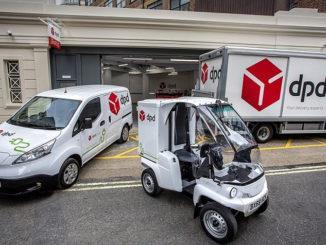
DPD has revealed its parcel volumes are at record levels as the COVID-19 pandemic triggers a massive spike in home deliveries.
The company’s sister network – DPD Local – servicing shippers with smaller volumes, has also seen a “huge surge” in demand.
“Easter was double what we did last Easter,” DPD marketing director Tim Jones told motortransport.co.uk. “We’ve been seeing up to a million parcels a day throughout the crisis. Volumes are surpassing the busiest days at Christmas and Black Friday.
“Our feeling is many sectors are sustaining and we have new sectors, particularly food, which are in high growth and it’s giving us these extra volumes.”
Jones said the lockdown had also helped improve its home delivery success rate.
“With road usage being so low, and so many people at home, the delivery success rate is incredibly good. Our service quality has also been at record levels. It’s good news. Lockdown is driving a huge demand for home delivery, it’s a very buoyant period.”
The pandemic has helped confirm that the e-commerce trend “will only get bigger”, Jones added. “It’s possible that a longer-term output of the lockdown will be an acceleration of that growth.”
DPD food deliveries are now up to 300,000 a week, he revealed. The company is also doing "thousands more" NHS deliveries and offering a collection and delivery service of 3D printers producing PPE for the army.
However, he said DPD was not enjoying a profit boom: “When you get a surge in volume you get a surge in costs,” he said. “So it isn’t a money making thing for us. You have to have the drivers there, the extra vehicles, the extra line haul and hub labour. More volume doesn’t mean more profit, it means we’re busy which is great and we hope we’ll win new customers through this.
Read more
- DPD’s NHS Thursday sets higher target as idea gathers pace
- DPD launches free delivery service to supply 3D-printed face shields to NHS
- DPD ramps up food deliveries with Morrisons’ essential grocery box deal
“But we’re not rubbing our hands in glee. There’s no sense that this is an opportunity, it’s been a challenge. It’s a sombre period for us and we hope things get back to normal as soon as they possibly can.”
The company’s commitment to the cause during the pandemic has generated “a lot of love” from the public for its drivers, Jones said: “A lot of customers knew their DPD drivers pretty well before all this and have wanted to say thank you with cards and gifts, and there are a few more DPD drivers who have their own Facebook fan pages now!
“But there have also been some incredible stories of drivers going above and beyond by getting shopping for elderly people who hadn’t been able to get out or cupcakes for a little kid whose family hadn’t been able to get a birthday cake!”
DPD has only had to furlough around 200 of its 13,000 staff and hasn’t pursued any financial support from the government: “We only furloughed them because there was no work to do when we closed the shop network,” Jones explained. “The vast majority have stayed in work and I want to give a shout out to our front line operators who adapted to our new processes incredibly quickly – contact free delivery, maintaining two metres at the door and in the depot etc. We’ve also put chevrons down everywhere and put new entrance and exit doors in.”
Jones claimed the pandemic would be “the catalyst for advancement in all sorts of technologies including remote meetings”.
“Video conferencing will become much more of a normal thing,” he said, “and other types of remote meeting will explode – apps like Zoom and House Party and Skype.”
However, he rejected recent claims by technology experts that the outbreak would speed the adoption of drone deliveries by parcel companies.
“For me, drones are still very niche,” he said. “There’s a role for taking urgent packages to hospitals and for prescription deliveries to remote locations. But I see multi-drop drivers servicing suburban houses. Drones buzzing around at every house is never going to happen. There are a lot of issues to do with vandalism, crime and the weather, for example. So I just can’t see a future where drones are taking off and landing at doorsteps. They've got a much higher role in security - patrolling perimeters.
“It could be the case that [the pandemic] advances the role of the drone but I don’t see them being a mainstream home delivery vehicle.”
Jones added that the company's investment in all-electric vehicles has been unaffected by COVID-19 and that it was still on target for 10% of its fleet to be electric by the end of the year.













